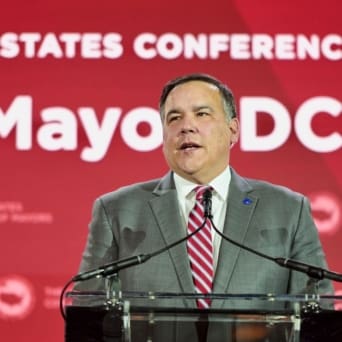As cities emerge into a new phase of the COVID-19 pandemic — moving past stay-at-home measures and other public health orders while still grappling with the long-term consequences — some common trends have surfaced among American cities. Across the country, local leaders are confronting similar issues — from housing and violence prevention to parks and street infrastructure. The recent influx of federal relief funds put cities in a unique position to have resources to fund short-term solutions, but those aren’t permanent. Cities are seeking to make change through long-term solutions.
Looking to the future, cities are approaching these challenges by learning from each other, seeking input from residents, and finding innovative, sustainable solutions tailored to their communities’ needs. These are four areas to watch for local action this year:
1. Housing Protections
It’s hard to find a single city that isn’t talking about housing in 2023. There is a well-documented housing shortage nationwide, and even when people can find housing they often can barely afford it. Over the last 20 years, average rent has increased 13%, compared with median income rising less than 1%. This has left almost 20 million people rent-burdened, meaning they spend 30% or more of their income on rent. Despite clear connections between housing and health, a right to housing is not guaranteed. Some assistance is available to eligible tenants, but the limited supply of subsidies and surging cost of rent means that safe and affordable housing continues to elude millions of people.
There is no singular solution to reverse course; intricate problems often require complex solutions. But momentum for several key policy solutions is growing as cities are rising to meet the challenge:
- Legal Support: Free access to legal representation is a pillar of the U.S. justice system — at least when you’re accused of committing a crime. But if you’re getting evicted? In most places, there is no guaranteed right to counsel. Legal Support for Renters policies are vital because the consequences of this representation disparity are clear: in eviction proceedings, on average, 82% of landlords have legal representation compared to only 3% of tenants. Recognizing this inequity, cities like Baltimore are guaranteeing a right to legal representation for all tenants in eviction cases. In some cases, like in New Orleans, the policies began as temporary pilot programs that eventually became permanent. Other cities, like Nashville, currently have pilot programs that city leaders could decide to establish as permanent policy. The benefits of representation are significant. Cities that guarantee representation have seen eviction filings drop by as much as 30%, and over 80% of tenants were able to remain in their homes.
- Rental Registries and Proactive Inspections: Healthy Rental Housing policies that keep an inventory of all rental units can provide a city with an accurate understanding of its current housing stock and rental market. This information can also inform housing and community development. Cities like Louisville have recently passed rental registry policies, while others go further to include proactive inspections of rental properties. Such inspections protect tenants’ health and absolve tenants of needing to file a formal complaint in order to get health and safety hazards addressed.
- Housing Financing: There has been a recent spate of housing bonds garnering resounding support from voters. Residents in Austin, Kansas City, and Raleigh have recently approved millions of dollars for affordable housing units, indicating how important quality, affordable housing is to voters. Meanwhile, cities including Kansas City are leveraging their states’ Low Income Housing Tax Credit programs to maximize housing options. As long as housing availability remains low and rent remains high, strategies like these — including with policies such as Affordable Housing Trusts — to improve housing affordability are likely to continue.
2. Built Environment
Cities have unprecedented amounts of federal funding thanks to the recent American Rescue Plan Act (ARPA) and infrastructure bills. Many cities plan to use these funds to improve street safety and park access. Complete Streets are essential for thriving downtowns, but unfortunately many cities are confronting a nationwide increase in pedestrian deaths. In response, watch for cities to implement safe streets and Vision Zero policies.
Along with Complete Streets, some cities are also focusing on improving parks and access to Greenspace. The pandemic brought the value of parks into sharp focus; not only can they provide safe gathering spaces, but evidence also suggests they provide mental health and crime reduction benefits. Recently, cities including Dallas have passed ballot measures to significantly increase park funding. Historically, residents have regularly supported conservation finance efforts, even through economic downturns and alternating presidential administration, indicating widespread and consistent support for green, accessible communities.
3. Universal Pre-K
Many mayors made access to universal pre-K a centerpiece of their campaigns and their administration’s priorities. Recent talk of universal pre-K at the federal level never materialized, leaving pre-K access largely up to states and cities. There are vast benefits of High-Quality, Accessible Pre-K in both the short- and long-term, with correlations to everything from increased immunizations and health screenings to higher earnings and lower crime rates. Pre-K classrooms also provide the crucial support of reliable childcare for families. Increasing access and quality of pre-K programs not only improves the health of communities — it’s also a policy with broad bipartisan and community support. This year, look for local action around pre-K access and quality.
4. Flavored Tobacco Restrictions
The Food and Drug Administration (FDA) recently proposed a rule prohibiting flavors, including menthol, in cigarettes and cigars. If finalized, this kind of sweeping change could help significantly reduce smoking rates, particularly among youth to whom flavored products are explicitly marketed. However, the FDA rulemaking faces a long, uphill battle, meaning it could be years before a flavor ban would be implemented. In the meantime though, states and cities can take similar action on their own. California’s voter-approved Proposition 31 banning flavored tobacco products recently withstood legal challenges and went into effect late last year. Columbus passed a city-wide flavor ban last year, and while this prompted the state legislature to attempt to curtail the city’s authority to do so, Governor Mike DeWine’s veto allowed the Columbus bill to stand. Watch for more city-level action around tobacco bans in 2023.

Cities have to be adaptable. They must respond to community needs swiftly, and they cannot be afraid to try something new in pursuit of meaningful solutions. With the dust settling after the worst of the pandemic, this is truer than ever. Whatever residents are calling for in this new era — from affordable housing to violence prevention to safe streets — mayors and city leaders will respond. As local leaders continue to take action, CityHealth is here to help. CityHealth provides research, sample ordinances, and data for policies that are proven to work. We help cities adopt the policies that will help residents live longer, healthier lives. We stand ready to help city leaders make 2023 a better year for their local communities.





